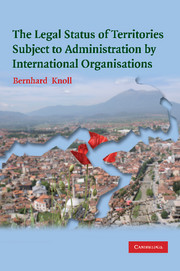Book contents
- Frontmatter
- Contents
- Illustrations
- Foreword: Pierre-Marie Dupuy
- Acknowledgements
- Table of Cases and Judicial Decisions
- List of Abbreviations
- Introduction
- 1 Creation of internationalised territories
- 2 Fiduciary administration: mandates, trust and the transitory sovereignty vacuum
- 3 Self-determination and the personality of internationalised territories
- 4 ‘The King's two bodies’: the dual functions of international administrations
- 5 Extent of UN authority in Kosovo and the problem of an open-ended institution-building mandate
- 6 The status process: Kosovo's endgame
- 7 An anomalous legitimacy cycle
- 8 Properties of a transitory legal order
- Concluding appraisal
- Bibliography
- Index
3 - Self-determination and the personality of internationalised territories
Published online by Cambridge University Press: 11 August 2009
- Frontmatter
- Contents
- Illustrations
- Foreword: Pierre-Marie Dupuy
- Acknowledgements
- Table of Cases and Judicial Decisions
- List of Abbreviations
- Introduction
- 1 Creation of internationalised territories
- 2 Fiduciary administration: mandates, trust and the transitory sovereignty vacuum
- 3 Self-determination and the personality of internationalised territories
- 4 ‘The King's two bodies’: the dual functions of international administrations
- 5 Extent of UN authority in Kosovo and the problem of an open-ended institution-building mandate
- 6 The status process: Kosovo's endgame
- 7 An anomalous legitimacy cycle
- 8 Properties of a transitory legal order
- Concluding appraisal
- Bibliography
- Index
Summary
The previous chapters of this study accounted for the phenomenon of ‘suspended sovereignty’, first, by supplying an in rem frame to explain the divorce between legal title to territory and jurisdiction over it. Chapter 2 broadened the analytical framework by accounting for the suspension of the application of general rules of international law and by introducing the novel rules that regulated the operation of the Mandate and Trusteeship systems. It applied McNair's and Berman's conception of the transitionality of legal norms, in which rules were grounded in a new ‘essential basis’. This chapter begins with a re-appraisal of the concept of collective entitlement to realise what has earlier been described as the ‘permanent promise’ of fiduciary administration – that of internal and possibly external self-determination. Administration by trust will thus be presented as a reaction to a general challenge to international law's normative foundation. In more metaphorical terms, the content of this promise points to the eventual return of ‘the sovereign’ disguised in garments spun by the machinery of self-determination. Her return in the Gestalt of the ‘peoples’ – an international actor newly constituted by the UN Charter – not only ends the hiatus created by the de-sovereignising principle of trust. As a dynamic principle designed to end colonialism, it also had a profoundly threatening impact on the configuration of nation states as such – ill-prepared, as they remain, for an increasingly empowered tribalism that relies on the second, stable promise of territorial sovereignty.
- Type
- Chapter
- Information
- The Legal Status of Territories Subject to Administration by International Organisations , pp. 111 - 148Publisher: Cambridge University PressPrint publication year: 2008



